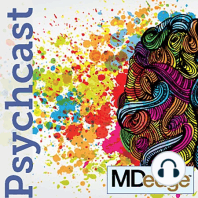12 min listen
Benzodiazepines for patients with serious medical illnesses
FromPsychcast
ratings:
Length:
28 minutes
Released:
Jul 17, 2019
Format:
Podcast episode
Description
Ep. 70 Show Notes By Jacqueline Posada, MD, 4th-year resident in the department of psychiatry & behavioral sciences at George Washington University, Washington. In this episode, Richard Balon, MD, returns to the MDedge Psychcast to discuss benzodiazepines. This time, Lorenzo Norris, MD, host of the MDedge Psychcast and editor in chief of MDedge Psychiatry, interviewed Dr. Balon about prescribing benzodiazepines for patients with serious medical illnesses. They also examine some of the controversies around benzodiazepines and common mistakes that some clinicians make when prescribing these drugs. Dr. Balon is professor of psychiatry at Wayne State University in Detroit. And later, in the “Dr. RK” segment, Renee Kohanski, MD, explores the need for psychiatrists to challenge the distorted thinking patterns of patients, particularly in light of the growing influence of social media. Dr. Kohanski, a member of the MDedge Psychiatry Editorial Advisory Board, is a psychiatrist in private practice in Mystic, Conn. Benzodiazepines can be used for patients with serious mental illness across several areas of medical illness, including those with cardiovascular, gastrointestinal, and sleep disorders, as well as for those with generalized anxiety disorder (GAD) and panic disorder. Cardiovascular illness Patients with cardiovascular illness might have just encountered a near-death experience and present with somatic symptoms of their cardiovascular illness and anxiety. This overlap of symptoms makes cardiovascular illness a reasonable comorbidity in which to use benzodiazepines for anxiety. A naturalistic study of patients with heart failure showed patients on benzodiazepines had a small decrease in mortality. The reason is unknown, but it could be from a decrease in anxiety and stress, both of which affect the heart. Older studies show that some benzodiazepines can be used in addition to antihypertensives. Gastrointestinal illness Benzodiazepines also are useful for such gastrointestinal (GI) illnesses as peptic ulcer disease, inflammatory bowel disease, irritable bowel syndrome, etc. The symptoms of GI illness, such as constipation, diarrhea, and nausea, can complicate the use of SSRIs or tricyclic antidepressants for anxiety. Older studies suggest that adding benzodiazepines to the regimen of these patients, especially those without substance use disorder, can improve outcomes. Sleep disorders Five benzodiazepines have been approved for sleep disorders: triazolam, flurazepam, temazepam, estazolam, and quazepam. These medications are used infrequently despite having a long half-life, which is useful for sleep initiation and maintenance. Quazepam is designed specifically for insomnia and has activity at a different part of the alpha subunit on the GABA receptor. Clonazepam also is useful, especially for patients with comorbid anxiety and sleep issues, because it contributes to sedation, and as a result of its long half-life, it continues to relieve anxiety throughout the day. Generalized anxiety disorder (GAD) and panic disorder Many clinicians are leery about using alprazolam for several reasons. The medication’s short half-life contributes to patients using the drug several times a day. Immediate relief of anxiety has a reinforcing effect, which in turn, increases the risk of abuse. There are no well-designed trials comparing benzodiazepines with SSRIs. Many of the recommendations about how to use benzodiazepines come from clinical experience. Some patients with GAD without substance use benefit from benzodiazepines such as clonazepam. It is possible for some patients to stay on long-term treatment with benzodiazepines and not need higher doses because of tolerance. Clarity is needed about the true impact of benzodiazepines on patients Benzodiazepines are an integral part of the psychopharmacology armamentarium yet are underused. Their use is increasingly discouraged, and trainees are not getting enough experience with
Released:
Jul 17, 2019
Format:
Podcast episode
Titles in the series (100)
Charles L. Raison: Ketamine and PTSD: How can ketamine or other psychedelic drugs impact some mental illnesses? by Psychcast
